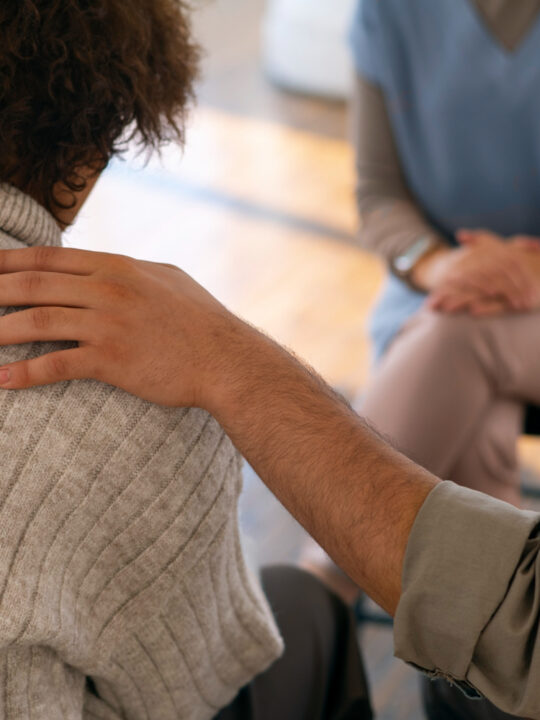 Losing a loved one is never easy. In fact, it’s one of the hardest things people, and even animals, go through. You’re so used to a person being in your life, and then one day they are gone. Whether it was a long- term illness, where their passing was almost sadly “expected,” to an unexpected and sudden death, both can be just as shocking and painful.
Losing a loved one is never easy. In fact, it’s one of the hardest things people, and even animals, go through. You’re so used to a person being in your life, and then one day they are gone. Whether it was a long- term illness, where their passing was almost sadly “expected,” to an unexpected and sudden death, both can be just as shocking and painful.
Their absence during the holidays, birthdays and special occasions without them can bring on sudden, strong emotions or reactions. Something as simple as sitting down and relaxing will suddenly bring on a moment of tears because they are just really missed. It’s all part of mourning, and we all do it in our own way, and in our own time.
The Mourning Process Begins
The mourning process can be an all- encompassing process, with the various stages of grief. The stages of grief are not the same for everyone. There are seven stages of grief, explained below, that occur. These stages occur differently for people, some being more intense or profound than others, and some lasting longer than others.
Understanding what we are feeling, and why we are feeling it as we are, can help in the process of healing from a loss. It’s a natural and healthy process to go through. Remember, there is no right or wrong way to grieve, and no time limit of how long the grieving process should take. Again, we all grieve in our own way, and in our own time.
The Seven Stages of Grief are Shock, Denial, Anger, Bargaining, Depression, Reconciliation and Acceptance:
1. Shock
Shock is the body’s automatic reaction from inability to accept the loss, and disbelief in regards to the loss of a loved one or friend. Feelings may be more intense if the loss was sudden or unexpected, but can be just as difficult to accept or comprehend if the person who passed was terminally ill and their passing was eventually expected.
2. Denial
Denial can be one of the most difficult stages of grief. We either deny that our loved one is gone, or deny our feelings concerning the loss. Or, it could be both, with our own personal emotional state not allowing us to accept that someone has passed.
3. Anger
Once it becomes painfully and abundantly recognized that your loved one has passed, anger occurs. The anger can be the outpouring of frustration that you can’t change the situation. You may be angry at yourself, that there was something you needed to say or do, and that chance no longer there. Anger may be besieged towards the people around you as well.
4. Bargaining
During the stage of bargaining, we as people frequently think irrationally. The why’s and what if’s cross our minds, a lot. Then there are thoughts of what could have been done, or could we ourselves have done something to make this right? There may even be thoughts of not being there enough, even though we were there every minute we could be.
5. Depression
People sometimes go through one, or all of the stages of grief. Regardless of the stages they have or haven’t experienced, the sadness and depression occur when we finally grasp and accept, as much as we may not want to, that our loved one has passed and will no longer be physically present in our lives.
6. Reconciliation
During the stage of Reconciliation, the sadness of grief begins to have an alternative meaning and purpose. Although your feelings of pain and loss have not, and most likely will not completely disappear, they begin to slowly fade into the background, and become less recurrent. You begin to realize that life is going to go on, and that you are meant to go on with it. You also begin to realize that it’s ok to go on, because you will never truly forget your loved one who has passed.
7. Acceptance
It may seem like Acceptance is a long way off, and that is ok. We get there eventually, and in our own time. This is the final stage where we realize it’s time to continue our lives and make future plans. It’s ok to look back and remember our loved one that has passed, have a few laughs and share a few tears, but not unpack and live there. We realize it is now time to continue to move forward in optimism, and continue to live a positive and happy life.
Coping with the loss of a loved one or a friend may take us through all of the Seven Stages of Grief, or we may only experience a few. As we grieve, it’s ok to feel what we feel, and cope as we choose to cope. It’s also ok to talk to or confide in trusted loved ones or friends. It’s always comforting to have a comforting shoulder to cry on.
When a Loved One or Friend is Grieving
When you have a loved one or a friend is grieving, it can be difficult to know how to comfort them, and help them cope. It’s hard to know what we may need ourselves to help us grieve and cope with a loss.
What do you say to make them feel better? What do you do?
When someone is grieving, they need to go through their emotions in their own time, and on their own terms. Some days they may need to be alone, other days they may need a listening ear. When that time comes, just be there for them. Listen to what they say, and how they feel.
If you are unable to be present right away, a condolence card, or condolence baskets with a personal message of support can help to let them know that you are there for them, even if not physically at the moment. An acknowledgement always speaks volumes, and will let them know you care.







